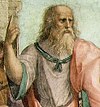“Critias” ( Greek Κριτίας ) is one of Plato’s later dialogues , containing a story about the powerful island state of Atlantis and its attempt to conquer the ancient Athenian state.
| Critium | |
|---|---|
| Genre | |
| Author | |
| Original language | |
| Previous | |
| Following | |
| Dialogues of Plato | ||||||||
|---|---|---|---|---|---|---|---|---|
 | ||||||||
| Dialogues are given in the sequence established by Trasill ( Diogen Laertius , book III) | ||||||||
| The first tetralogy: | ||||||||
| ||||||||
| The second tetralogy: | ||||||||
| ||||||||
| Third tetralogy: | ||||||||
| ||||||||
| Fourth tetralogy: | ||||||||
| ||||||||
| Fifth tetralogy: | ||||||||
| ||||||||
| The sixth tetralogy: | ||||||||
| ||||||||
| Seventh Tetralogy: | ||||||||
| ||||||||
| Eighth tetralogy: | ||||||||
| ||||||||
| Ninth tetralogy: | ||||||||
| ||||||||
|
“Kriti” is a continuation of the “Timaeus” dialogue, and has reached our times as unfinished. In the composition of the dialogue trilogy assumed by Plato, in which Timaeus and Critias were to be included, the Hermocrates dialogue was to follow Kritia. But the latter, as is commonly believed, was never written.
The participants in the dialogue are the same as in Timay: Socrates , Timaeus , Critias , Hermocrates .
Contents
Critius reports a war that occurred 9,000 years ago between Atlantis (a large island on the other side of the Pillars of Hercules ) and “our kingdom,” that is, Greece (108e).
Atlantis History
When the gods divided the surface of the Earth by lot, Greece was given to goddess Athena, and Atlantis to Poseidon (113c). Critias reports that Atlantis was greater than Asia and Libya (108th). Poseidon and his beloved — a mortal girl named Clayto (daughter of Evenor and Leucipppe) —– brought the pair of male twins to light five times. Poseidon raised them and assigned each of them a part of the island, dividing the whole of Atlantis into ten parts. The eldest of the sons - the one who was born first in the very first pair of twins - Poseidon appointed the best and greatest share, giving him the mother’s house and the surrounding possessions; and put this eldest son king over the rest of his sons. He appointed the rest of his sons as archons (114a).
The name of the eldest son, who was put king over other sons and, accordingly, over the entire island, was Atlant, and in honor of his name were called "the island and the sea, which is called the Atlantic." From Atlanta there was "a particularly numerous and revered clan, in which the oldest was always king and passed on the royal order to the eldest of his sons, from generation to generation maintaining power in the family." The power of the Atlanteans spread east to Tirrenia and Egypt (114c).
Geography of Atlantis
The central plain of the island stretched for a length of 3 thousand stades (540 km), 2 thousand steps in width (360 km), the center of the island was a hill located in 50 stages (8-9 kilometers) from the sea (118a). Poseidon for protection surrounded him with three water and two land rings; Atlants, on the other hand, threw bridges through these rings and dug canals, so that the ships could sail along them to the city itself, or, more precisely, to the central island, which had 5 stades (a few less kilometers) in diameter. The Atlantean army consisted of 10,000 chariots and 1,200 ships (119b).
On the island was located the temple of Poseidon in 1 stage long, 3 plethra (90 m) wide and high. Inside the temple was placed a statue of a god on a chariot drawn by six winged horses, as well as a hundred Nereids on dolphins .
Plato devotes a lot of space to describing the unprecedented wealth and fertility of the island, its densely populated, rich natural world, where even elephants dwelt and the Orichalc mineral was mined (114e).
The Death of Atlantis
Thanks to the abundance of natural wealth of the island and the wise rule of the descendants of Poseidon — the sovereign and the archons — the state of Atlantis was strengthened and flourished. But over time, the "inherited from God nature" was exhausted, "repeatedly dissolving into a mortal impurity, and human temper prevailed." And then the Atlanteans "were unable to endure their wealth and lost their decency," and mired in luxury, greed and pride.
The last part of the dialogue that has come down to us describes what the supreme god Zeus decided to punish the people of the Atlanteans, "who fell into such a miserable depravity." For this, he convened all the gods "and addressed the audience with these words ..." - the dialogue ends at this place.
Hypotheses about incomplete dialogue
Dialogue Critias reached us in the unfinished form. There are several hypotheses about this. The main ones are:
- Plato actually finished the dialogue, but the ending was lost and therefore did not reach us.
- Plato for some reason could not finish the dialogue, although he was going to do it. Presumably, Plato could ponder over the ending and not write it right away; then he was forced to do other things and postpone the writing of the ending of “Critia”, which he could not return to, since after a not very long time his death followed.
- Plato deliberately left the dialogue unfinished.
Literature
- Kondratov A.M. Atlantis of the Sea of Tethys. - Leningrad, Gidrometeoizdat, 1986. - p. 10-13.
- Kukal Z. The Great Mysteries of the Earth // Atlantis in the light of modern knowledge. - Translation from Czech. - Moscow, Progress, 1988. ISBN 5-01-001077-1
